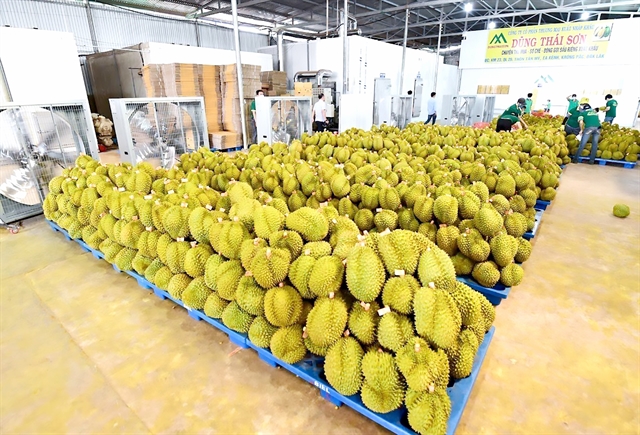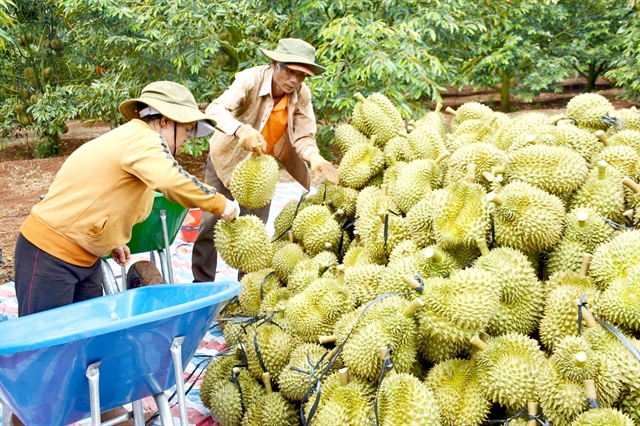 Society
Society

 |
| Durians are harvested in Đắk Lắk Province. — VNA/VNS Photo Hoài Thu |
ĐẮK LẮK — Over a year since durian was officially permitted for export to China, farmers in Đắk Lắk have greeted this year's harvest with jubilation, due to high yield, favourable prices, and substantial profits.
Nonetheless, the season has exposed several issues and hurdles that must be addressed to ensure the sustainable cultivation of durian in the Central Highlands province of Đắk Lắk.
The demand for durian in recent times has been robust, resulting in high prices and significant earnings for the growers in the region.
Farmers have been able to transform their lives with the selling price hovering around VNĐ40,000 (approximately US$1.6) per kilogram.
Phan Văn Thuật's family relocated from the central province of Hà Tĩnh to Tân Hòa Village in Tân Lập Commune, Krông Búk District, thirty years ago. His 2.5-hectare durian plantation has yielded profits surpassing VNĐ2 billion (around $81,900) this year.
Thuật recalls that before durians, his family cultivated coffee and pepper, which proved to be unreliable and financially damaging.
In 2005, the family took the initiative to plant durian trees. Now, thanks to Thuật's enthusiasm for adopting technical methods in his farming practice, his family has become prosperous.
Another farmer, Y Như Ayun from Jung Village in Ea Yông Commune, with his 135 durian trees, reported that his family now enjoys an annual income exceeding VNĐ1 billion ($40,800).
His family was able to build a spacious house, buy a car and many other valuable items.
Tạ Văn Châm, deputy chairman of the Ea Yông Commune People's Committee, said the commune's durian output this year reached about 30,000 tonnes.
It helps reduce the poverty rate to 0.2 per cent.
Challenges
Bùi Thanh Huỳnh, the director of the Buôn Hồ Agricultural Cooperative, commented on the uncertainty overshadowing this year's durian crop in the province.
Before the harvest commenced, traders visited the orchards offering lofty sums, with prices soaring to as much as VNĐ93,000 per kilo.
However, as the main season unfolded, these prices were abruptly slashed.
Moreover, the deputy chairman, Châm, noted laxity in the enforcement and adoption of planting area codes.
This led to unethical practices where some enterprises misappropriated codes belonging to cooperatives for packaging and exporting their goods, which resulted in conflicts regarding the ownership of the codes.
In addition to these issues, the durian cultivation zones in Đắk Lắk Province are dispersed, small-scale, and exhibit a wide range of technical standards.
Logistical expenditures are steep, constituting 30 per cent of the overall costs.
The market for durians is marked by price volatility, and there is an absence of punitive measures to regulate prices or assure product quality.
Furthermore, the collaboration among farmers, cooperatives, and businesses lacks cohesion and clarity.
Director of the ROFC Agricultural Service Cooperative in Krông Năng District Nguyễn Đại Dương said that the cooperative has 12 official members and 80 affiliated households, cultivating 100ha of durian.
In the crop this year, farmers freely sold their fruit without quality control, and did not comply with previously signed commitments.
“Farmers, cooperatives, traders, and businesses do not have a common voice. Trust is broken, connection fails. The loss of gardeners' reputation means that the long-term association between businesses and farmers may be suspended in the following seasons,” he said.
Vũ Đức Côn, the deputy director of the provincial Department of Agriculture and Rural Development and chairman of the provincial Durian Association, expressed concern that merely 11,000ha of durian – nearly half of the total plantation area – were fruit-bearing.
He posed a critical question regarding the future of durian pricing: when the total area of over 22,500ha of durian trees in the province reaches maturity and yields fruit in about four years' time, will the prices of durian remain elevated?
Develop planting codes
 |
| Farmers check their durians at a farm in Buôn Hồ District. — VNA/VNS Photo Hoài Thu |
To this point, Đắk Lắk Province has endorsed 49 planting area codes encompassing a total of 2,186ha.
Since the outset of the year, various management initiatives regarding planting area codes have been put into action by departments and local entities.
Nevertheless, subsequent to the allocation of these codes, numerous enterprises have fallen short of maintaining the requisite quality standards.
Instances of code misrepresentation and breaches in plant quarantine have been recorded.
Nguyễn Hoài Dương, Director of the Đắk Lắk Department of Agriculture and Rural Development, stressed that adherence to growing area codes and packaging codes is a critical and immediate necessity, calling for robust enforcement.
He urged local authorities to heighten their oversight of companies that buy and export fruit, as well as the households in the cultivation areas awarded codes.
He advocated for a shift in focus from quantity to quality within the designated planting areas and recommended that details about these locales be published on the local website.
Looking ahead, the provincial agricultural sector intends to sustain the integrity of the areas that have been granted codes, embracing information technology and digital transformation for their management.
Furthermore, there will be a concerted effort to guide farmers towards adopting production processes that manage pests in a manner that is safe, biological, and ensures food hygiene and safety.
The province is also determined to take decisive action against commercial fraud and the wrongful use of growing area codes.
Nguyễn Thị Thu Hương, deputy director of the Plant Protection Department under the Ministry of Agriculture and Rural Development, conveyed that the department plans to finalise technical guidelines and establish standards covering everything from seeds and fertilisers to cultivation, brand recognition, and production technology for the benefit of farmers.
She asserted that those guilty of impersonating growing area codes would face punitive measures as per the prevailing regulations.
Responsible community
To develop durian sustainably, departments and districts in Đắk Lắk Province have been focusing on building durian brands.
Following the establishment of the brand "Krông Pắc Durian" in August this year, the province has added the brand "Cư M'Gar Durian". This is a good premise because each locality that does well in its durian brand will contribute to building and enhancing the Vietnamese durian brand.
Chairman of the Cư M'Gar District People's Committee Vũ Hồng Nhật said that in order for the Cu M'Gar durian brand to stand firmly in the domestic and foreign markets, the district would enhance brand promotion, encouragement and support people to develop the brands.
The district will also strengthen connection of four stakeholders: businesses, scientists, farmers and the government to jointly exploit the value of the Cư M'Gar durian brand.
They will create quality, organic durian products with clear origin to serve official export markets.
Along with branding, departments, businesses and cooperatives in the province have actively linked and found durian consumption markets.
Post-harvest durian processing and diversifying durian products are also focused on and initially achieved many positive results.
Lê Anh Trung, director of External Affairs under the Vạn Hòa Group, suggested the Ministry of Agriculture and Rural Development soon issue specific standards for the durian industry.
From that basis, businesses can develop specific linking policies.
Standards for the durian industry should be based on the Vietnamese Good Agricultural Practices (VietGAP) with more than 70 safety criteria.
Trung added that in the durian chain, all stages need to fully conduct their roles and responsibilities, identify the industry as a home and a profession.
At the Forum "Identifying the current situation of durian consumption and export in 2023 and solutions for effective and sustainable development of Việt Nam's durian industry" taking place in September this year, Minister of Agriculture and Development Rural Development Lê Minh Hoan emphasised that sustainable development is not about sustainable durian trees, but about people participating in the sustainable durian industry.
Cooperation between businesses, cooperatives and farmers is a long-term strategy, creating trust to the growing area.
Therefore, associations and industries must play their full role in providing information about the market, prices, and giving warnings, whereas farmers are responsible for their land.
Đắk Lắk Province's orientation is to stabilise durian area at over 22,000ha and output at over 225,000 tonnes. — VNS




